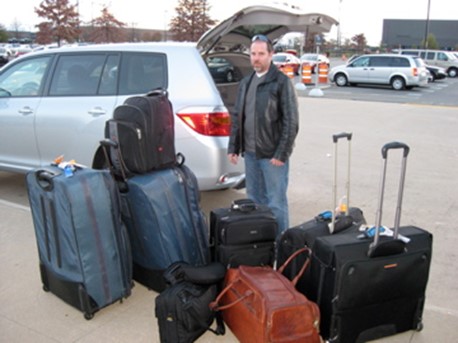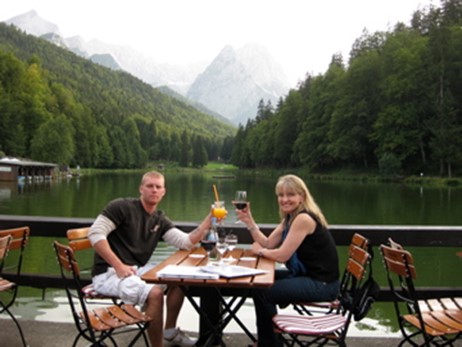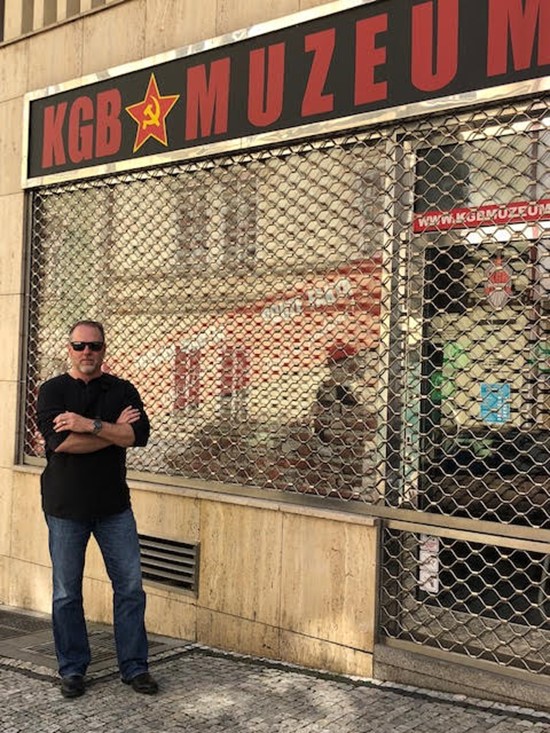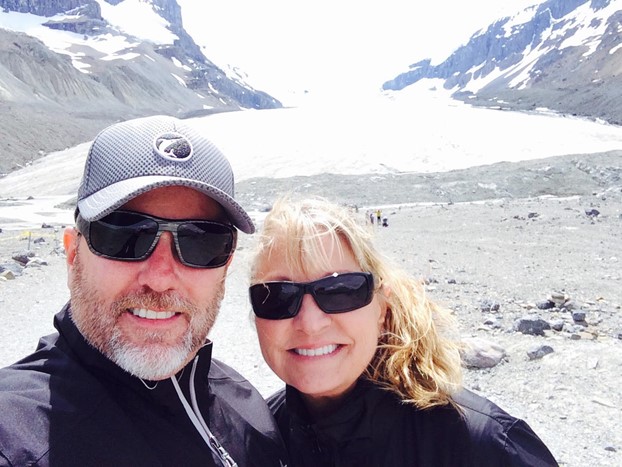When I started gathering material and making notes for my book, The Protected, it wasn’t long before I realized that many topics and examples primarily arose from my travel experiences. Maybe this is why the famed Berber-Moroccan scholar and traveler, Ibn Battuta, was quoted as saying: “Traveling – First, it leaves you speechless, then turns you into a storyteller.”
Ibn left home at 21 to see the world around him and became so entranced by his experiences he didn’t return home for over 25 years.
The Many Rewards of Travel
I’ve always found the benefits of travel ― both for business and leisure ― to be mostly favorable. And even therapeutic at times. As an international security professional and operator, a great deal of traveling is part of the job. But, understandably, traveling can also be stressful. Especially during times of conflict, increased threats of terrorism and the new “era” of COVID-19.
What I appreciate most about traveling is that you must use all of your senses from start to finish. Even if the efforts leave you somewhat exhausted, I find the reward is worth it. When I reflect on the stories I like to share with others the most, they often involve some sort of travel experience with a few valuable lessons learned.
The benefits can include:
- Allowing you an escape from the day-to-day routines,
- Gaining new perspectives, and
- Challenging all senses (auditory, visual, smell, taste, touch).
But I think I would actually put gaining new views at the top of that list. A better perspective can improve your planning skills and help you be more organized. Moreover, it certainly enables you to become more mindful in ways you aren’t at home or in the office.
Finally, it can definitely push you outside of your comfort zones regarding culture, conversation, and history.
The Downside of Conference Calls
I understand the benefits of Zoom calls. Yes, they reduce travel costs and are much safer during certain periods (such as a global pandemic). Furthermore, they are essential for those who do business in areas with a higher risk factor due to conflict, terrorism, and crime.
But when it comes to business or professional travel, a conference call can never replace actual human interactions, which we sometimes refer to as “boots on the ground” or “ground truth.”
It’s easier to hide the truth on a conference call and perhaps not get the complete picture. However, it’s much harder to do this when you’re there in person.
The security and intelligence industry has come a long way to help prepare a security traveler with valuable information and technology, including:
- Pre-trip reports with current intelligence,
- Location/s background, GPS routes,
- Maps,
- Weather,
- Geopolitical concerns,
- Criminal and terrorism concerns,
- Upcoming events, known Persons of Interest (POIs) to your principal, and other pertinent information.
Yes, technology has allowed any operator to more effectively prepare before even landing in a new location. However, all of that intel can’t replace physically being there (nor should it, in most cases).
All this information is incredibly helpful, but it can never do the personal work for you once you step out of the airport and begin your journey. Your senses are immediately heightened: the smell of the air, the sounds of languages or accents, the tempo of the human and vehicle traffic rushing by you, and the general atmosphere of the city and those you come in contact with as they either welcome your visit or are suspicious of your every move.
How Traveling Changed Me
Some of our greatest authors, songwriters, and philosophers have gained inspiration from travels in order to create their great works. Authors like Jack London, Agatha Christie, Mark Twain, John le Carre, Hemingway, J.K. Rowling, and scores of others would have never been as successful without their travel adventures and abilities to weave their experiences into their works.
I appreciate the new perspectives I have developed while living and traveling in countries where other religions, customs, and laws were vastly different from what I have known in the U.S.
I’ve had the unique privilege and opportunity to travel extensively in my career and lived abroad for nearly a quarter of my professional life. If these opportunities had not occurred, I genuinely believe I would not be the person I am today.
At times, however, my perspectives have been challenged. An example was when I was part of a protective team working for the CIA. We engaged in cross-border protective operations between countries like Israel, Palestine, and others. As we all know, this particular region and some of its people have been in violent discord for centuries (with no actual resolution in sight yet).
Fortunately, I’ve enjoyed many interesting conversations and have “broken bread” with both Israelis and Palestinians. So it is essential to be there in person and talk to people because you then realize that probably the majority on both sides just want the same thing: recognition and peace to live their lives without fear, conflict, or condemnation for their religious beliefs.
Walking as a Personal Protocol
As a security operator in a foreign land, it’s paramount that you quickly get acclimated to your new environment and conditions. But also that you understand what we refer to as our area of operation or AO.
When traveling as a close protection agent or intelligence officer and after checking into my hotel, one of my first personal protocols was to get out for a walk around the area of my hotel as soon as possible. I wanted to get a good sense of what was normal, what was not, and how to fit in best.
If I was on a protective mission, this was even more important if my principal stayed at the same hotel. It was also a chance to see if I could determine any type of hostile surveillance at our hotel or location. On rare occasions, the opposite would occur as I stayed out of sight, and we would let a third party provide that information based on the protective mission, the principal, and the threat.
Minimalism for the Security Operator
In 2008, my wife and I packed up our 4,000 square foot home that we had spent the previous four years meticulously decorating and placed all of our belongings in long-term storage.
We selected only the items we really thought would be nice to have with us. In fact, we packed it all in a 4′ x 4′ palleted “box.” We chose some books, many photos, some kitchen items, clothes, personal gear, etc. Along with eight pieces of luggage (all my wife’s clothes – that’s my story), we relocated to Abu Dhabi in the United Arab Emirates for a new challenging position.
It didn’t take long to get established and comfortable in our new apartment. In particular, because it had a mesmerizing view of the turquoise Persian Gulf overlooking the Corniche (the street along the beach).
We came to realize having less “stuff” was actually liberating. In fact, we spent the next two fulfilling years working, making lifelong friends, and traveling to some of the fascinating parts of the world for work and pleasure. We have many great memories and stories of those years.
From Germany to Iraq
At the same time, my son was serving in the U.S. Army and was deployed to Iraq for 18 months. The fact that he was so close was both comforting and unnerving, knowing the risks. We were fortunate to have the unique chance to spend a few hours with him as he passed through Dubai and headed back to Iraq during his only R&R. We actually shared a couple of celebratory drinks with him for his 21st birthday in a bar in the Dubai airport.
Several months later, we visited him in Germany, where he was stationed after Iraq. And also, coincidentally, he lived there for the first six years of his life when I was based in Germany with the U.S. Air Force. So we took him on a bit of road trip through the famous and well-traveled romantic road, making our way down to Munich and the German Alps.
After 18 months in Iraq and living in an M1 Abrams tank, my son found driving on the autobahn and visually absorbing the green German countryside to be a life-enriching experience. In addition, we all enjoyed being together in Germany, making new memories over a few fine German beers.
While I was a civilian at this time, Abu Dhabi was my 18th relocation since joining the military in 1984. I’ve added six more moves since returning from Abu Dhabi.
Now, I’m the VP of Global Security for an international land development company. So, I get to combine both my passion for security and travel all in one. Often, when I travel for leisure, it’s nice to totally disconnect and savor the experience and make meaningful memories.
However, due to my profession, I have to stay connected to work much of the time, but if that’s the price I must pay for travel, I’m okay with it. My wife likes to jokingly remind me that she has a picture of me with my head down on my smartphone in every city and country we’ve visited. Point taken.
Strolling the Ancient Cobblestone Streets
Traveling has opened my mind and thoughts to the world outside of the U.S. When traveling the world, you gain a new appreciation for the life and freedoms we can take for granted and understand even more why so many risks their lives to come to America.
They face so many struggles just getting here, much less assimilating into our myriad U.S. cultures. I’ve had my own challenges living in other countries. Only mine were temporary.
As I mentioned before, gaining new perspectives is what I have enjoyed the most about my travels. Sometimes they manifested in a better understanding of other global citizens, their histories and stories, struggles, and enviable successes. Sometimes I gained more empathy for an unimaginable plight to most humans.
A significant benefit of abundant amounts of travel for my profession is that I can feel comfortable in just about any location worldwide. In addition, the “culture shock” factor of working, living, and vacationing abroad has mostly worn off by now. Even in places like India, where shock is usually the first emotion you experience.
But I’m still awed by architecture (the simple and the complex), the unique tastes and aromas of foods everywhere, and enjoying the many distinctive sounds of music, languages, and accents around the world, along with sharing professional dialog with my global colleagues.
And while I appreciate strolling the age-old cobblestone streets and alleyways of the world and stepping reverently into ancient cathedrals, I can never get enough of the earth’s majestic landscapes. I am most humbled and at peace when experiencing what nature and God have fashioned, no matter what country I’m in at the moment.
Winding Down With Collective Anxiety
The pandemic forced us to slow down. But it also caused many to turn to other forms of distraction like social media, news, and countless hours of binge-watching movies and TV series.
Having a pandemic during a presidential election with a fraught transfer of power didn’t help control our collective anxiety. Moreover, watching this horrible Russian invasion of Ukraine isn’t helping my screen time either.
I’m convinced there is now and will continue to be a negative ripple effect from too much screen time. All of society (but especially our younger citizenry) seems to be developing a specific social awkwardness from this intense focus on screens, with too few healthy conversations and human interactions.
If you gave me a choice between giving up all my “smart technology” and the talking heads on TV or giving up my luggage and backpack and not traveling, I wouldn’t give the decision a second thought.
Like any addiction, it might be difficult initially. It may also frustrate me for a few days or weeks while working through my smartphone withdrawal.
But as soon as I was on an airplane and arriving at a new or familiar destination and hitting the streets, footpaths and waterways, tasting the local cuisines, and engaging in interesting conversation, my addiction to technology would rapidly dissipate. Hearing the native accents and colloquialisms while absorbing the impact of history and the splendor of nature around me would make me easily forget about the technology addictions and gadgets.
Maybe my true addiction is travel.
In Conclusion
I recall living in Germany while in the military in the 1980s. We didn’t have cell phones, and we had access to one television channel (the Armed Forces Network or AFN). That is where we got our news highlights and a few TV shows and movies. We did not need a TV remote with only one channel, and no one had home computers or smartphones.
Don’t get me wrong. I enjoy a good history show or binge-watching the Jason Bourne movie series or Yellowstone series as much as the next person.
However, having quick answers to any possible question my mind can think of is an incredible luxury I enjoy. And if I’m too lazy, I can simply speak to my TV remote, Siri or Alexa, who are “always listening.” Just like a guy in a trench coat standing outside your window at night in the rain, smoking a cigarette under a dim streetlamp. Seriously.
My question is: Has all of this technology made any of us better people? My opinion is “no.” Travel and interpersonal connection are what will always, hands down, enrich our human existence. And we are straying far from that.
Let traveling make you a better person, operator, and hopefully, a storyteller.
Mike









